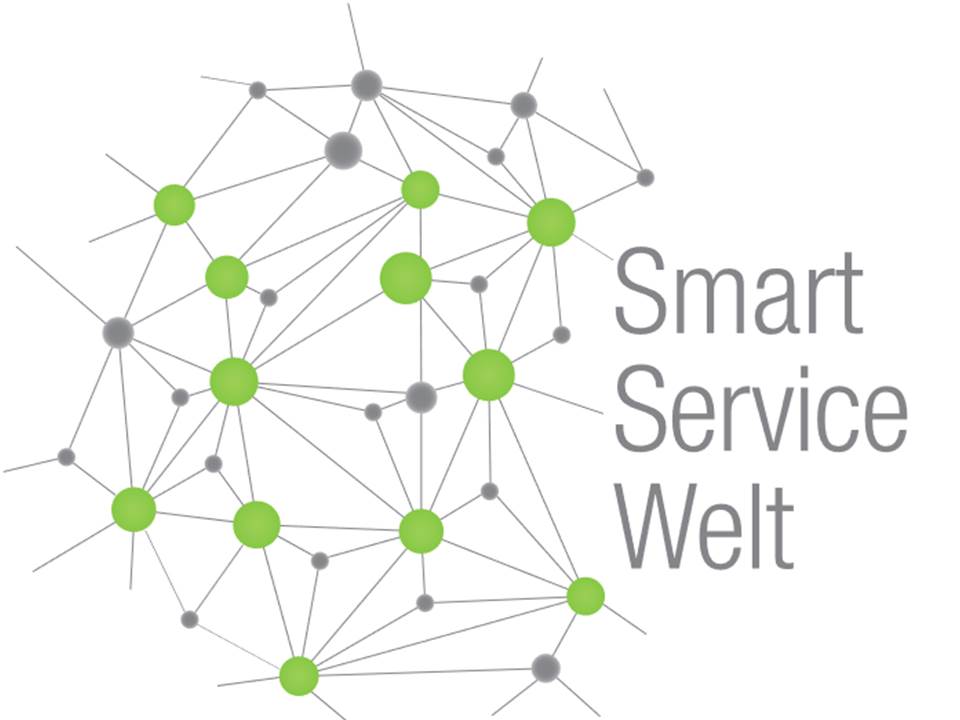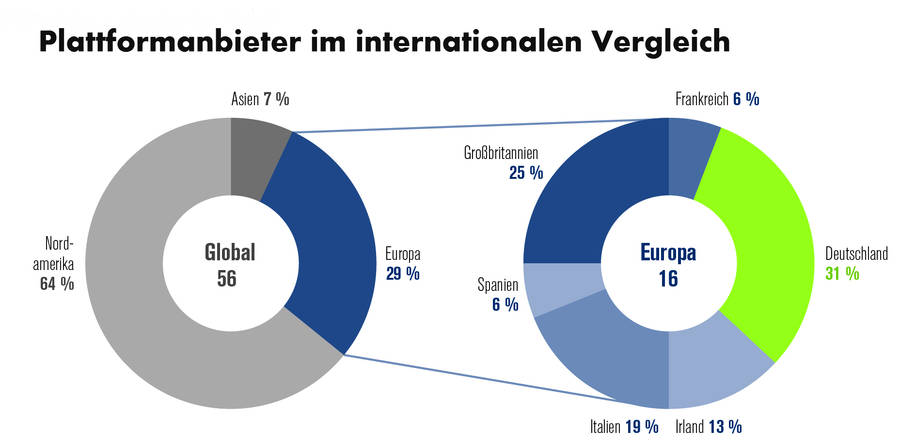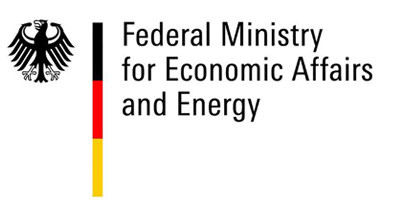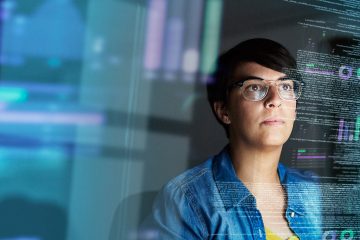Digital service platforms – success factors for the Smart Service Welt

© Erfurth Kluger Infografik GbR
Background
The digital transformation is resulting in rapid changes to value chains across all branches of industry. In the Internet of Things, Data and Services, increasingly large volumes of data are being generated by people, devices and machines and analysed on digital platforms. Big data is transformed into individually configured smart data that has been refined using software in order to meet specific needs.
The smart services that are created using this data combine smart products with data-based services. Digital platforms are at the centre of this Smart Service Welt, helping to connect people, products, services, engineering and production processes and infrastructure.
acatech’s “Digital Service Platforms” project addresses the implementation of smart services in different industries – manufacturing, logistics, energy and healthcare – and provides guidance on the development of digital business models, particularly for small and medium-sized enterprises (SMEs). A series of use cases illustrate how users and providers of smart services can join the platform economy.
Smart Service Welt 2018 – Where are we now and where are we going?
The Smart Service Welt 2018 report reviews what we have learned so far from the various activities of the Smart Service Welt project, presents the latest knowledge and describes the outlook for the future. It also identifies the relevant challenges and formulates a series of general recommendations. “Where are we now and where are we going?” – the report discusses these fundamental conceptual questions in the context of the three key themes of business model innovations, technological enablers, and management & organisation.
Aims
The central importance of digital service platforms was already highlighted in the final report of the working group Smart Service Welt – Web-based Services for Businesses, which was launched as the second strategic project of the Federal Government by the Federal Ministry for Economic Affairs and Energy (BMWi) and acatech. To be successful, German and European platform operators and smart service providers must work together to build digital ecosystems around their products and services. Although Germany is the leading platform operator in Europe, it is still a long way behind the US.
acatech’s “Digital Service Platforms” project responds to this situation by investigating the success factors for implementing smart services on digital service platforms through a number of practical examples. It sets out to collect experiences in order to produce guidelines for cooperation in digital ecosystems. To this end, the project brings together partners from academia, industry, professional associations and the trade unions. Another important aspect of the project is to ensure coordination with existing funding initiatives and parallel research.

Key questions addressed by the project
- What experiences from existing digital platforms can be drawn on to support the ongoing development of current platforms and additional smart services provided on them?
- What form should cooperation between platform providers and platform users take?
- Which factors have a key influence on the scalability of data-based services?
- What requirements can be identified for the key field of digital education?
- How can innovative digital business models be implemented in the form of smart services based on a standard marketplace design?
- How can smart services be integrated with existing application environments and how can we ensure comprehensive service interoperability?
- Are there any synergies with existing initiatives and how can we establish open communication with related initiatives?
- How are data-based services developing in different countries around the world and what market trends can be observed?
- How can we design an end-to-end toolchain in order to support the development of smart services among start-ups, SMEs and medium-sized companies that are not involved in the IT industry?
Recommendations
- The promotion of open, public domain platforms will be key to ensuring Germany’s technological leadership in the Smart Service Welt.
- Help SMEs to make a rapid transition to the platform economy by establishing an onboarding factory for Germany (see below).
- Put people at the centre – smart services in the context of a changing workplace.
What is an onboarding factory?
The term “onboarding” derives from the field of human resources management, where it refers to the process of integrating new employees into an organisation. By analogy, here it refers to providing the support that (small and medium-sized) companies need in order to join the platform economy (quite literally “getting them on board”).
Several studies have found that SMEs need more support with the digitalisation of their value creation processes. Comprehensive digitalisation is often hampered either by their size or by their management, employment or financial structures. The focus of the service provided by an onboarding factory is on innovation through data-based services (smart services). The service provider offers access to the knowledge that they have assembled on innovations in the platform economy, provides illustrations of best practices in different industries and supplies advice on the technological aspects. The participating companies attend workshops where the innovation potential of their current business model is analysed, with the results being used to develop smart service prototypes.
A network of established companies and partners from academia and government is on hand to provide advice. This creates a neutral framework for companies taking their first steps in the world of data-based services. Organisational development is also addressed with reference to the different internal target groups (corporate management, managers responsible for IT/digitalisation, production managers), since it is important that the digital transformation required by the Smart Service Welt should be firmly anchored in the company’s corporate strategy.
An onboarding factory model that takes strategic links with existing initiatives and the advice requirements of SMEs into account is currently being developed as part of the project.
MOOC Smart Service Welt
Smart Service Welt MOOC
The English-language version of the Smart Service Welt MOOC was launched on 19 June. Anyone interested can now register free of charge at https://open.sap.com/courses/ssw1-tl?locale=en (SAP SE MOOC platform). The German version of the MOOC can be accessed on the acatech mooc.HOUSE channel (https://mooc.house/courses/ssw-2018).
MOOC course content
Introduction
- Introduction to the Smart Service Welt – Prof. Dr. Henning Kagermann (acatech) and Frank Riemensperger (Accenture)
Week 1 – Smart Services and Business Model Innovation
- Introduction to Week 1 – Frank Riemensperger (Accenture) and Dr. Helmuth Ludwig (Siemens)
- Smart Service Welt overview – Frank Riemensperger (Accenture)
- Digital business models in the Smart Service Welt – Prof. Dr. Rudolf Müller (BISS Institute Maastricht University)
- Business model innovations – Dr. Helmuth Ludwig and Matthias Köhler (Siemens)
- Digital customer experience – Matthias Schrader (Sinner & Schrader)
- Digital customer service – Martin Wild (Media Markt Saturn)
- Smart services for SMEs – Prof. Dr. Thomas Bauernhansl (Fraunhofer IPA), Prof, Dr.
- Matthias Mehrtens (Kärcher) and Michael Nilles (Schindler)
- Ecosystem innovation (excursus) – Dr. Markus Pertlwieser (Deutsche Bank)
Week 2 – Technological Enablers for the Smart Service Welt
- Introduction to Week 2 – Prof. Dr. Henning Kagermann (acatech) and Prof. Dr. Wolfgang Wahlster (DFKI)
- Digital Innovation System – Dr. Hans Jörg Stotz (SAP)
- Personalisation of smart services – Prof. Dr. Anthony Jameson (DFKI)
- Smart service software platform & ecosystem – Ulrich Ahle (FIWARE)
- Industrie 4.0/mechanical engineering platform – Dr. Marco Link (Adamos)
- Artificial intelligence – Prof. Dr. Wolfgang Wahlster (DFKI)
- Decision-making support in smart services – Prof. Dr. Anthony Jameson (DFKI/Chusable)
Week 3 – Smart Services, Management and Business Organisation
- Introduction to Week 3 – Prof. Dr. Henning Kagermann (acatech) and Frank Riemensperger (Accenture)
- Companies in the digital ecosystem – Prof. Dr. Katja Windt (Jacobs University Bremen)
- Smart services and business organisation – Reinhold Groß (Trumpf Werkzeugmaschinen)
- Culture eats strategy for breakfast (excursus) – Dirk Hoke (Airbus)
- Smart services and the future of work – Jürgen Kerner (IG-Metall)
- Smart services and training – t.b.c.
Week 4 – Smart Service Best Practices
- Introduction to Week 4 – Prof. Dr. Henning Kagermann (acatech) and Frank Riemensperger (Accenture)
- Energy – Dr. Olfa Heil (Hitachi)
- Mobility and logistics – Michael Bültmann (HERE)
- Smart homes – t.b.c.
- Healthcare/pharma – Dr. Werner Eberhardt (SAP Health)
- Energy – Martin Becker (Siemens)
- Finance and insurance – Christof Reinert (Munich Re)
- Mobility and logistics – Dr. Daniela Gerd Tom Markotten (moovel Group)
- Government – Dr. Alexander Tettenborn (BMWi)
- Telecommunications – Dr. Ferri Abolhassan (Deutsche Telekom)
Project group members
Working Group “Platforms and Eco-Systems”
- Dr. Peter Weckesser
Airbus Group (Co-Leitung) - Bernd Altpeter
DITG GmbH - Klaus Bauer
Trumpf GmbH & Co. KG - Hans-Peter Bock
Trumpf GmbH & Co. KG - Jackson Bond
relayr GmbH - Andreas Brandt
Deutsche Börse AG - Gerd Brenner
Trumpf GmbH & Co. KG - Michael Butschek
Siemens AG - Burkhard Dümler
adidas AG - Dr. Filip Feyaerts
Printing International Group - Dr. Thomas Friese
Siemens AG - Mandy Galkow-Schneider
Deutsche Telekom AG - Marlene Gerneth
Deutsche Telekom AG - Dr. Lutz Hager
IKK Südwest - Philipp Jussen
RWTH Aachen - Prof. Dr. Achim Kampker
RWTH Aachen - Bodo Körber
Accenture GmbH - Dr. Ulrich Löwen
Siemens AG - Prof. Dr. Wolfgang Maaß
Universität des Saarlandes - Prof. Dr. Matthias Mehrtens
Kärcher GmbH & Co. KG - Jens Mueller
relayr GmbH - Carsten Polenz
SAP SE - Dr. Albrecht Ricken
SAP SE - Alexej Roytburg
Deutsche Börse AG - Marten Schirge
Device Insight GmbH - Harald Schoening
Software AG - Jan Speich
Deutsche Post DHL - Ernst Joachim Steffens
Deutsche Telekom AG/T-Labs (Research & Innovation) - Dr. Hans Jörg Stotz
SAP SE - Patrick Vollmer
Accenture Gmbh
Body of experts “Digital Education”
- Prof. Dr. Gesche Joost
Universität der Künste Berlin (Leitung) - Jens Brajer
Carl Zeiss AG - Prof. Dr. Angelika C. Bullinger-Hoffmann
TU Chemnitz - Dr. Svenja Falk
Accenture GmbH - Dr. Anja Grage
Thyssenkrupp AG - Karl-Heinz Hageni
IG Metall - Dr. Kathrin Heckner
Wittenstein AG - Peter Klingler
DEKRA - Marc-Sven Kopka
XING AG - Dr. Norbert Koppenhagen
SAP SE - Christoph Kunz
Siemens AG - Prof. Dr. Volkmar Pipek
Universität Siegen - Dr. Cordula Proefrock
Robert Bosch GmbH - Claudia Roscher
TU Chemnitz - Wolfram Sauer
XING AG - Hans Speidel
CrowdGuru GmbH - Christian Wachter
imc information multimedia communication AG - Prof. Dr. Volker Wulf
Universität Siegen
Body of experts „Technological Enablers“
- Prof. Dr. Wolfgang Wahlster
DFKI GmbH (Co-Leitung) - Bernd Leukert
SAP SE (Co-Leitung) - Dr. Ammar Alkassar
Sirrix AG - Dr. Heinrich Arnold
Deutsche Telekom AG - Dr. Hermann Becker
ZF Friedrichshafen AG - Dr. Anselm Blocher
DFKI GmbH - Dr. Dietmar Dengler
DFKI GmbH - Jan-Henning Fabian
ABB AG - Dr. Wolfram Jost
Software AG - Prof. Dr.-Ing. Peter Liggesmeyer
Fraunhofer IESE / TU Kaiserslautern - Gerhard Mutter
SICK AG - Dr. Norbert Reithinger
DFKI GmbH - Dr. Hans Jörg Stotz
SAP SE - Dr. Stephan Wess
Empolis GmbH




